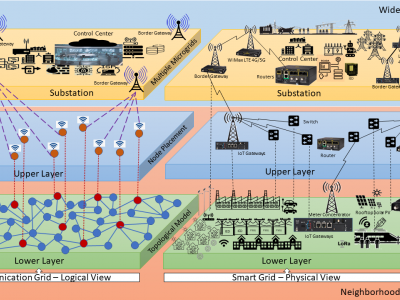Wireless Networking
Neighbourhood area networks (NANs) lay the foundation for robust communication in smart grids to support stable and secure end-user connectivity with substations. Firstly, the current solutions are unrealistic to meet the time-bound requirements for smart grid applications with large number of intermediate node connectivity in NANs. Secondly, the existing Low-power Wireless Personal Area Network (LoWPAN) do not scale up to thousand nodes while meeting the latency requirement of delay-critical smart grid applications.
- Categories:
 41 Views
41 ViewsThis paper investigated how to increase the number of connections among users in hierarchical non-terrestrial networks (HNTNs) assisted disaster relief service (DRS). We aim to maximize the number of satisfactory connections (NSCs) by optimizing the unmanned aerial vehicles (UAV) radio resources, computing resources, and trajectory at each time slot. In particular, the UAVs are exploited as aerial base stations (ABSs) to provide a link for the reduced capability (RedCap) user equipment (UE) based on power domain non-orthogonal multiple access (PD-NOMA).
- Categories:
 609 Views
609 Views
The maximum flow problem based on contact graph in DTN is very important for routing and data planning. Common topological graphs with non-sequential changes include Dinic, ISAP and other deterministic algorithms for solving the maximum flow between two nodes. But these algorithms cannot be directly applied to topological networks with time series changes. At present, Iosifidis.G has given a solution to this problem based on the time expansion graph, but his method requires high storage space, and the increase in the number of nodes means increasing high time complexity accordingly.
- Categories:
 104 Views
104 ViewsThis dataset focuses on cooperative spectrum sensing in a cognitive radio network, where multiple secondary users collaborate to detect the presence of a primary user. We introduce multiple cooperative spectrum sensing schemes based on a tree deep neural network architecture, incorporating a one-dimensional convolutional neural network and a long short-term memory network. The primary objective of these schemes is to effectively learn the activity pattern of the primary user.
- Categories:
 1425 Views
1425 ViewsAbstract—This paper presents a novel approach to optimizing resource allocation in Internet of Things (IoT) networks, focusing on enhancing energy efficiency (EE) while maintaining age of information (AoI) awareness through device-to-device (D2D) communication. Our proposed solution integrates simultaneous wireless information and power transfer (SWIPT) with energy harvesting (EH) techniques. Specifically, D2D users employ time switching (TS) to harvest energy from the environment, while IoT users utilize power splitting (PS) to obtain energy from base stations (BS).
- Categories:
 853 Views
853 Views
This is a dataset for TCS-Fall.
A total of 20 volunteers were invited to take part in the experiment. Each volunteer performed hundreds of falls and non-falls.
All fall data and non-fall data are stored in binary files that can be parsed by Python or matlab.
- Categories:
 285 Views
285 Views
The extended bandit learning game algorithm can search the best solution for the hybrid discrete-continuous strategy space. At each learning time, the player can quickly decide based on a finite discrete strategy pool, thereby improving the learning efficiency.
- Categories:
 54 Views
54 ViewsDataset: IQ samples of LTE, 5G NR, WiFi, ITS-G5, and C-V2X PC5
Thes dataset comprises IQ samples captured from ITSG-5, C-V2X PC5, WiFi, LTE, 5G NR and Noise. Six different dataset bunches are collected at sampling rates of 1, 5, 10, 15 , 20, and 25 Msps. In each dataset cluster, 7500 examples are collected from each considered technology. The dataset size at each considered sampling rate is 7500 X M, where M can be 44, 220, 440, 660, 880, and 1100 for a sampling rate of 1, 5, 10, 15 , 20, and 25 Msps,respectively.
- Categories:
 3848 Views
3848 ViewsDataset for Identification of Saturated and Unsaturated WiFi Networks
The Dataset comprises the histogram of Inter-frame spacing for saturated and unsaturated WiFi networks.
In order to develop a CNN model that can classify saturated and unsaturated traffic in WiFi network, we prepared a large dataset that represents the traffic characteristics of both cases.
- Categories:
 283 Views
283 ViewsDataset for Identification of Saturated and Unsaturated WiFi Networks
The Dataset comprises the histogram of Inter-frame spacing for saturated and unsaturated WiFi networks.
In order to develop a CNN model that can classify saturated and unsaturated traffic in WiFi network, we prepared a large dataset that represents the traffic characteristics of both cases.
- Categories:
 388 Views
388 Views



